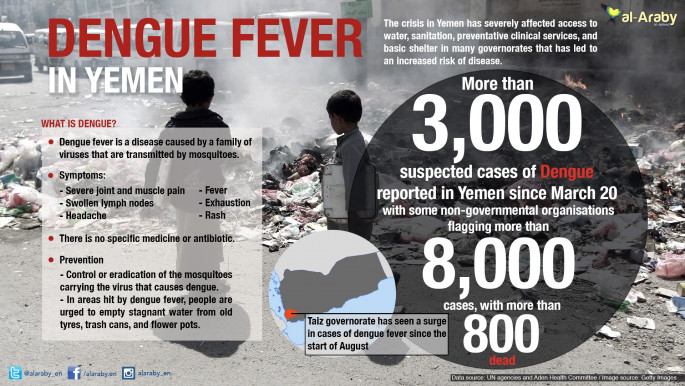Yemen: Sharp rise in cases of dengue fever
Analysis: An increase in dengue fever in Taiz has led to calls by the WHO to establish a safe corridor to reach those most desperately in need.
2 min read
Fighting in Yemen has left many vulnerable to disease [AFP]
A sharp rise in cases of dengue fever has been recorded in Taiz governorate over the past two weeks, according to the World Health Organisation.
The number of suspected cases increased from 145 at the start of August 2015 to 421 by 25 August.
The sudden increase has prompted the WHO to call for a safe corridor to be opened to reach more than 3 million people in Taiz.
"There is an urgent need for a humanitarian corridor to assess the situation and institute control measures," said Dr Ala Alwan, WHO's regional director for the Eastern Mediterranean.
"We need protection and safety for all people working to control the worrying outbreak of dengue fever in Taiz, which includes support with residual spraying, health education of communities and distribution of other supplies," Alwan said.
Located near the southern tip of the country, Taiz is the most populated governorate in Yemen, with 3.2 million inhabitants.
However, three of its major hospitals are now inaccessible due to the ongoing fighting. As a result, many sick, displaced and wounded civilians have been denied access to health services, said the WHO.
More than 800 deaths and 6,000 injuries have been reported in Taiz since March 2015.
The desperation of the situation is being exacerbated by rising levels of dengue fever.
"With the ongoing insecurity and mass displacement of thousands of people, it is likely that the situation will deteriorate in the coming days, placing over 3.2 million people at additional risk," the agency said.
In June, the WHO reported a surge in cases of dengue fever - endemic in Yemen. Outbreaks follow seasonal patterns with the highest number of cases usually reported from April to August.
Sewage, rotting rubbish, and, even worse, rotting bodies, that have piled up on streets in parts of Yemen have become fertile breeding grounds for the mosquitoes that carry the dengue virus.
A mosquito-borne viral infection gives symptoms of dengue fever that appear 3-14 days after infection. It causes a flu-like illness that can develop into a potential life-threatening condition, especially without proper supportive medical care.
The number of suspected cases increased from 145 at the start of August 2015 to 421 by 25 August.
The sudden increase has prompted the WHO to call for a safe corridor to be opened to reach more than 3 million people in Taiz.
"There is an urgent need for a humanitarian corridor to assess the situation and institute control measures," said Dr Ala Alwan, WHO's regional director for the Eastern Mediterranean.
"We need protection and safety for all people working to control the worrying outbreak of dengue fever in Taiz, which includes support with residual spraying, health education of communities and distribution of other supplies," Alwan said.
Located near the southern tip of the country, Taiz is the most populated governorate in Yemen, with 3.2 million inhabitants.
However, three of its major hospitals are now inaccessible due to the ongoing fighting. As a result, many sick, displaced and wounded civilians have been denied access to health services, said the WHO.
More than 800 deaths and 6,000 injuries have been reported in Taiz since March 2015.
The desperation of the situation is being exacerbated by rising levels of dengue fever.
"With the ongoing insecurity and mass displacement of thousands of people, it is likely that the situation will deteriorate in the coming days, placing over 3.2 million people at additional risk," the agency said.
In June, the WHO reported a surge in cases of dengue fever - endemic in Yemen. Outbreaks follow seasonal patterns with the highest number of cases usually reported from April to August.
Sewage, rotting rubbish, and, even worse, rotting bodies, that have piled up on streets in parts of Yemen have become fertile breeding grounds for the mosquitoes that carry the dengue virus.
A mosquito-borne viral infection gives symptoms of dengue fever that appear 3-14 days after infection. It causes a flu-like illness that can develop into a potential life-threatening condition, especially without proper supportive medical care.
 |





 Follow the Middle East's top stories in English at The New Arab on Google News
Follow the Middle East's top stories in English at The New Arab on Google News


